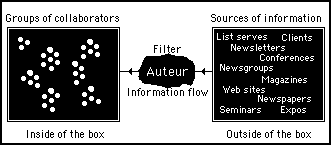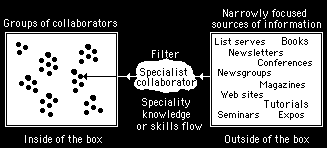
Chapter 12
A question of trust
What is the role of the auteur?
The obvious objection to a collaborative approach to creating an e-business solution is that there appears to be no control over the direction that a solution takes. If nobody is taking a conventional leadership role, guiding the direction of the multiple approaches, it might seem that this can lead to confusion and much wasted effort.
The book "The Entrepreneurial Web" dealt with this problem. That book was written in the same way as this: with a virtual cafe of readers who commented and gave their views and objections at each chapter. The strategy for creating e-business solutions, as proposed in that book, was to evolve a solution without any pre planning, without any pre-conceptions. This was described as a bottom up approach where the solution emerged as a direct result of feedback.
At first, there was great concern that such a strategy would be directionless and could lead the solution into a dead end. However, when it was explained that the strategy depended upon the construction of a suitable communication framework that provided the right kind of feedback to keep the project on course, the fears were allayed.
This is the key to the success of a genetic algorithm strategy. The leader, or, auteur, of the solution is not the architect of the solution: their role is more that of a conduit, to funnel and filter all relevant information to the collaborators working on the various approaches to the solution. Primarily, the leader is a skilled communicator whose views are not self generated but are the aggregate input of his or her sources of information. This doesn't direct the system specifically, it creates a continuous feedback that keeps projects on track in the same way that feedback will keep the direction of a guided missile on target even when the target weaves and turns.
At this stage it is important to visualise the structure of a system that is developing an e-business solution. The critical factor is that an e-business solution is being created in an environment of unknowns, unpredictability and an evolving knowledge base that is expanding too fast for any single person to be omniscient.
The system creating the e-business solution can be broken up into two distinct areas. For want of a better way to describe them let's call them 'inside the box' and 'outside of the box'. Inside the box will be the collaborators. This will be organised along the lines of a genetic algorithm strategy, where collaborators are mixed and matched, come and go. The collaborators will each be bringing into the box their unique set of skills or specialised knowledge.
Assuming that no collaborator is omniscient, they will each have to confine their focus of interest to a fairly narrow field: their particular area of speciality. As we saw in an earlier chapter, experts often assume they have knowledge in areas outside of their own particular speciality. This is a constant source of danger inside the box, especially if a collaborator assumes a knowledge that none of the other collaborators have sufficient experience to be able to contradict.
To counteract this danger, the auteur has to provide independent influences that can prevent an e-business solution drifting off in a wrong direction. This is a problem for the auteur, because he or she is also unlikely to be omniscient. The auteur will almost certainly have large knowledge gaps just as surely as any of the collaborators. To plug all the knowledge gaps, the auteur has to look outside of the box.
Outside of the box is a vast confusion of conflicting knowledge and information. The auteur will have to devise a strategy to make sense of this confusion and filter out just the right information to fill the knowledge gaps of the collaborators working inside of the box. This is the area of the auteur's speciality: focusing an adequate and appropriate information flow from outside of the box to the inside. This is illustrated in figure 12.1.

Figure 12.1
The role of the auteur in the creation of an e-business solution
It is often assumed, by people who have never been in an entrepreneurial position, that an entrepreneur is a wheeler dealer, a manipulator and an autocratic exploiter of other people's talents. This is seldom the case. The role of the entrepreneur is more usually that of an information provider: an auteur, who works not as a decision maker but as the organiser of appropriate information for others to be able to make decisions. In this way, the entrepreneur or auteur, will function in an evolving system similar to the way in which oil functions in a mechanical engine: the essential element that seems not to be doing any of the real work, but, is vital to the running.
The entrepreneurial input has to create an environment of trust and confidence. Trust that collaboration will be rewarded and confidence that the whole venture will succeed. This is quite different from the role of leadership as understood by most management theories where trust and confidence may have different connotations. The difference is that an entrepreneur has to create an environment of trust and confidence that is completely independent of people - even independent of the entrepreneur that creates this trust. This is particularly important in the fast changing, technological world of e-business, because neither the entrepreneur or any of the collaborators can be omniscient - they will all be fallible.
Mostly, an entrepreneur will rely on an honest reputation and evidence of adequate funding. This will ensure collaboration because collaborators can feel assured that they will be rewarded according to any understandings agreed upon at the commencement of their collaborations. However, this isn't sufficient to assure that the system of collaboration will proceed efficiently. It needs individual confidence that not only will the result of any collaboration lead to a successful conclusion, but, that any collaboration will lead to more opportunities for profitable collaboration in the future.
With cooperative teams, where team members are engaged as employees on a permanent basis, the necessity to give confidence that further remunerative work will become available isn't an issue. With collaborative work, this may be a critical issue, not only for an agreement to collaborate but also as an incentive for a collaborator to make the maximum effective effort. The ability to inspire this kind of confidence is dependent upon how successfully the entrepreneur, in the role of auteur, can find and filter information from outside of the box.
In the fast changing world of computer technology, all experts and specialists will have to narrowly focus. They will need to be not only expert in their chosen field but constantly on the alert for changes and new directions. This will require full time concentration. Just like the auteur, they will have to be continuously linked to a plethora of different information sources to be aware of changes in their field and to know what they have to learn to keep abreast of the changes - they will also have an interest in what is happening outside of the box, albeit in a limited area of knowledge. This similarity can be seen by comparing figures 12.1 and 12.2.

Figure 12.2
The role of the specialist collaborator in the creation of an e-business solution. Each will have an area of special interest outside of the box.
Like the auteur, the specialist collaborators will have to make sense of a confusing world of uncertainty. They'll have to take risks: as to the way they spend their time; the sources of information they choose to be influenced by; which new areas of study to pursue. In almost every instance of speciality in the e-business environment, the expert will need all the time they can find, just to avoid going backwards. They will have very little time to spare to become more than casually acquainted with what is going on elsewhere.
For this reason, a collaborator will be looking for more than just fair payment for the work they do. They will be looking at the effect the participation is going to have on their progression in their chosen speciality profession. They will be looking to collaborate on projects that can bring them into contact with new people, new influences and new directions. They will want to be able to enhance their reputations so they will want to be associated with successful projects, especially if they involve innovations or cutting edge technology.
It is down to the communication skills of the auteur to make sure that the collaborators are made aware of the latest advances in technology, made aware of the progress of competitors, made aware of possible dead-ends and pitfalls. This needs dedicated and full time work and concentration by the auteur, so, he or she will have very little time available to mollycoddle people and cater for their moods swings or changes in temperament.
Certainly it won't be the cozy atmosphere that would be the hall mark of a cooperative team. It will be an association of professionals who are getting off on the freedom to do their work well, improving their reputations, making new contacts: all in the heady atmosphere of a project in which everyone has confidence that it is heading in the right direction. It's not about loyalty and altruism, its about being part of a universal revolution that is applying digital technology to improve the way in which everyone can lead our lives.